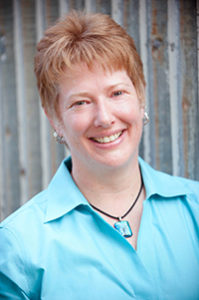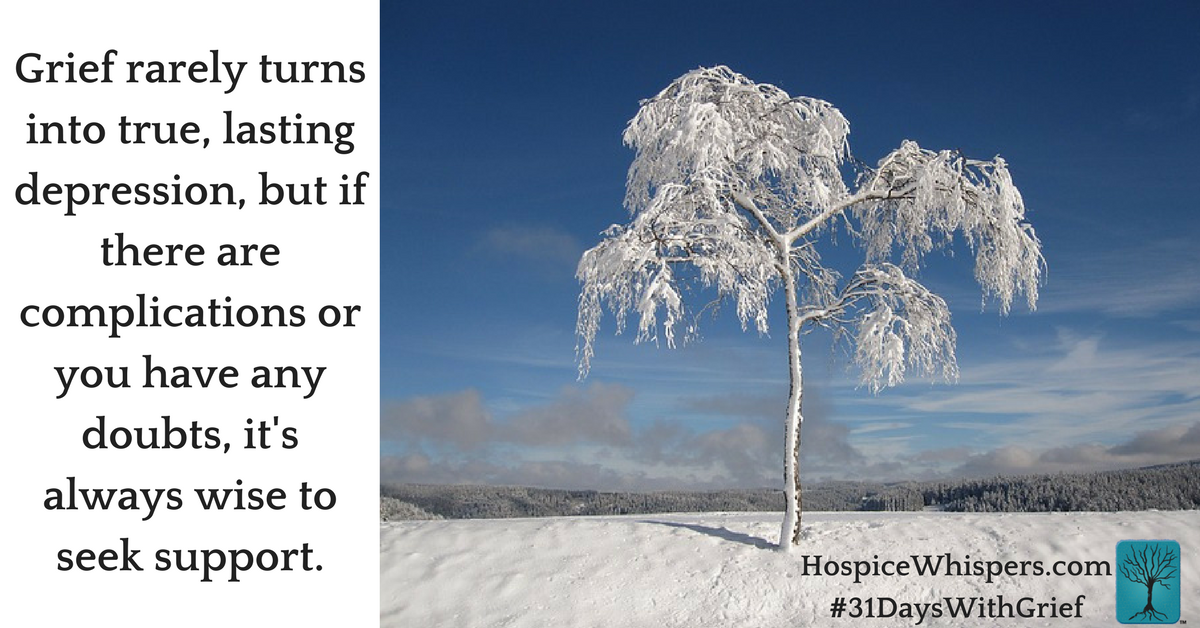31 Days of Walking with Grief: Others’ and Our Own
Day 27—Am I Stuck?
This is a month-long series to support persons grieving and those who love them. It includes content from “Sharing Our Stories: A Hospice Whispers Grief Support Workbook” available through Amazon and wherever books are sold.
We’re not sure we know how to do this…
“Am I stuck?” This is one of the most common questions I hear from those who are bereaved. Having never done this before, and living in a society that is still struggling to catch back up in our willingness to discuss death and grief, we’re often lost at sea and wonder whether we’re doing it right.
We are bombarded by others’ ideas about what our grief should look like, how we should handle it, and how long it should last. The good news is that, statistically speaking, you’re probably doing it just right! Only about 10-15% of cases turn into what is known as Complicated Grief that requires more professional intervention and support.
Other times, a piece of grief can linger, popping up from time to time, but in a way that is only uncomfortable for a moment and does not truly hold us back from working, sleeping and eating, having relationships, and mostly enjoying life. In those latter and more severe cases, clinical help is a must. But even those periodic and momentary gut punches deserve a space to be processed and healed.
A loved one died years ago. It was complicated for me by the fact that we held a difference of belief that was significant enough for her to choose to distance herself from me. That piece was already a source of huge sadness and grief, but it became even more so when any chance for reconciliation and repair died along with her.
It comes up for me from time to time, and I’ve been working with it to find even more healing. Though it has not been severe enough to interfere with my daily life, I attend to it because any rocks on my path can slow me down, hold me back, and cause an unnecessary ache in the toe I keep stubbing on it.
An excerpt from Sharing Our Stories…
Sometimes, grief can be even more complicated, like the story from this section of Sharing Our Stories: A Hospice Whispers Grief Support Workbook:
One woman contacted me after reading Hospice Whispers, asking for my help. She said she didn’t know what was wrong with her, but that everyone was telling her she “should be over it.” When I asked her what SHE thought, she replied,
“Well, I should be, shouldn’t I? But I’m just not, and I can’t make it happen. Then I feel guilty and ashamed and even more alone and angry and misunderstood, which pisses me off even more!”
“Find places where people can let you just be. When you find that, and don’t feel rushed, I’m pretty certain you’ll notice something loosen inside of you over time. ‘Wallow’ as long as you need to. In fact, roll around and nest in those feelings as much as you need. When you’re done with them, you’ll know. Life usually doesn’t allow us to stagnate too long, and if we’re stuck, we’ll eventually know it instinctively from within, not because others are rushing us to move on their timetable.
Feelings need room to move and breathe. When they feel pushed back against, they tighten. When they are given space, they can relax and shift as they need. It will happen naturally, without pushing, from you or anyone else.”
Certainly, there are cases in which people do get stuck and the natural grief process stalls. In others, the naturally intense feelings of grief can become so magnified that it leads to dysfunction. The body can get caught in a pain loop and need outside assistance, and there is no shame in getting support from a counseling professional when such complicated grief arises.
Places like The Center for Complicated Grief through the Columbia School of Social Work (https://complicatedgrief.columbia.edu/) and others can provide more guidance and resources on this topic.
I heard back a few months later from this woman who struggled with her grieving process. She had joined a special yoga class for those who had experienced grief. She laughed, “I thought it was ironic that you encouraged me to find a place to let my feelings move and breathe, and then I stumbled into this yoga class completely by accident. I didn’t have to explain myself to others in the class because they were there for the same reasons. I could just go in and, well, be!”
I could hear in her voice the very relief she described. It was beautiful. And according to her, it worked to help move her to a new place. And THAT is exactly what I hope this workbook will provide you—a safe space for your feelings to just be.
(Sharing Our Stories: A Hospice Whispers Grief Support Workbook, pp 8-9)
What I did not take the time to share in the workbook is that I did assess her level of functional impairment—questioning to see if she was eating, sleeping, grooming, paying bills, working, engaging in relationships, etc. She was. But she was still angry with God and could not bring herself to attend religious services or celebrate religious holidays with her family, and they were concerned it was time for her to move on.
She wanted to do so, but pushing and forcing was not the answer. Also, as I wrote in yesterday’s post about the factors that can mediate the mourning process, some circumstances can make it more or less complicated and hard to endure. In this case, there were some circumstances I’ll not share in order to protect her identity, but that significantly complicated her grief, and would have for ANY human being.
Given the complicated circumstances, her grief was completely understandable and just needed more time than would most, but it also needed support! As she found safe spaces to give her that time and freedom to move, it did.
Is it grief or depression…or complicated grief?
Now, for those cases that are complicated in severity and/or duration, it is important to seek professional support because the natural grief process is either overwhelmed by the severity of the circumstances of grief and/or the natural process has stalled. Normal grief can mimic depression but is not considered to meet the clinical definition until it has lasted longer than 6 months.
Freud is often quoted for his distinction between grief and depression, “…after a loss, the world looks poor and empty; while in depression, the person feels poor and empty.”
When any 3 of the following last for at least 6 months, we consider the person to be experiencing Complicated Grief: thoughts and feelings of grief that are intrusive, leave a person feeling numb and/or in disbelief about the death, empty and purposeless, meaningless, irritable, and poorly functioning in their work, relationships, etc. If that is the case, then there is a need for an intervention.
There is no shame in this. Usually, there is a reason the grief is complicated that can be tended to with support. When an infection invades our bodies, our natural immune response kicks in to help us heal and recover. Sometimes, that infection is more than our system can take on and we need antibiotics to support our immunity. That is not weakness. That is not “crazy”. That is life and it happens, especially when complicating factors super-size the germs or hinder our immune response.
To be clear, grief doesn’t need to be complicated to seek support! Grief counselors and groups are always ready to walk the potentially scary and overwhelming road with someone who is in mourning and deserves an extra dose of support.
Whatever your circumstance, continue to be patient, be gentle, avoid shame at all costs, and find the support that your grief deserves.
Peace,
Carla
 Rev. Carla Cheatham, MA, MDiv, PhD, TRT has served hospices as a chaplain and bereavement coordinator. She’s the Section Leader for the Spiritual Caregivers Section of the National Hospice and Palliative Care Organization and an adjunct professor at the Seminary of the Southwest. Through her Carla Cheatham Consulting Group, Carla provides training and consulting for professional caregivers nationwide. She is the author of Hospice Whispers: Stories of Life and its companion volume, Sharing Our Stories: A Hospice Whispers Grief Support Workbook. Her next book, On Showing Up with Suffering: Others’ and Our Own, is set to publish in 2017.
Rev. Carla Cheatham, MA, MDiv, PhD, TRT has served hospices as a chaplain and bereavement coordinator. She’s the Section Leader for the Spiritual Caregivers Section of the National Hospice and Palliative Care Organization and an adjunct professor at the Seminary of the Southwest. Through her Carla Cheatham Consulting Group, Carla provides training and consulting for professional caregivers nationwide. She is the author of Hospice Whispers: Stories of Life and its companion volume, Sharing Our Stories: A Hospice Whispers Grief Support Workbook. Her next book, On Showing Up with Suffering: Others’ and Our Own, is set to publish in 2017.



Leave a Reply